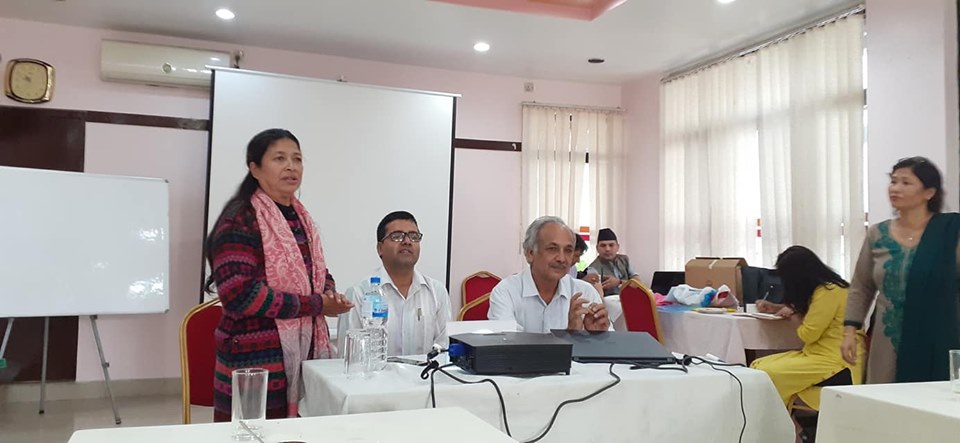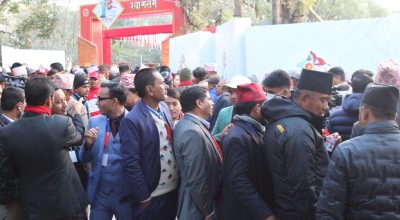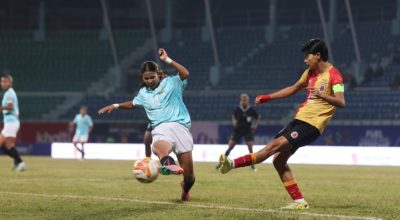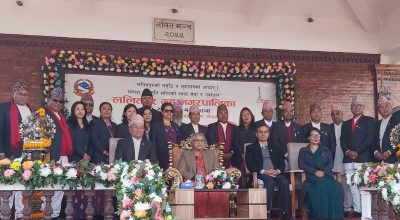
Hetauda, Nov 5 : Balancing her home life and meeting her profession deadline is a tall order for Sirjana Nepal, a radio journalist based in Makawanpur.
Journalism is a demanding profession but it is more so for the women journalists in Nepal. Compared to her male counterparts, Sirjana has to wake up early in the morning, eat whatever food she had kept in the refrigerator the previous evening and rush to the media house she works in to meet the deadline. So, she always seems in a rush. Moreover, Sirjana does not have her own means of transportation and has to go to work on public transport or by rickshaw. But the problem is that the salary she is paid is not enough to always hire a taxi or rickshaw to go to work, apart from meeting her basic expenses.
Although she is offered a lift by a fellow male colleague who lives in her neighbourhood and works at the same media house she works in, she is averse to this. She does not like to take lift in motorcycle or car of any male friend to go to office or to a programme. She has a bitter experience of this. As she said, some months back her male colleagues started talking all sorts of things about her when she took a lift offered by one of her male friend in his motorbike while going to her room.
It has been six years since Sirjana started working as journalist. She is still a teenager but is mature in terms of her experience of difficulties associated with the profession. According to her, she is suffering from discrimination economically, socially and psychologically just because of being a female journalist.
“How nice it would be if I could derive satisfaction socially although I might not be well off economically no matter how hard I work,” Sirjana expressed her exasperation. Recalling her male friend’s comments when she could not go to office after falling sick for some days, she said, “I was suffering from cough and cold but had to go to work as I was not granted a leave. When I reached office, the male colleagues made sarcastic remarks against me saying what was that I ate the previous days to suffer from this condition. They were perhaps hinting that I had taken alcohol, which was not the case. May be they would not poke fun like this if it was a male in my place.”
Sirjana narrated another incident of discrimination against her, thus: “Like all the other male journalists, I was also recording the voice of the State Assembly members at the parliament house. After getting his voice recorded, one of the State Assembly lawmaker patted me, asked my name and requested for my mobile phone number. But I had the feeling that he was asking for my phone number and my name for being a woman rather than as my being a journalist. Out of this feeling, I avoided him and moved to another place.”
She said incidents like these make her low in self-esteem. When asking for her salary at the media house she works in, she said the reply she gets most of the time is that why she needed money as she does not have a family to provide for. Comments like this leave her astounded.
“Women journalists face both risk and financial lack,” said WWJ Makwanpur’s outgoing chair Ranjita Dangol.
Despite having the qualification and competency on a par with male counterparts, women journalists are most of times neglected in terms of opportunities for capacity enhancement, capacity exposure, and promotion as male journalists are the priority of media houses. According to her, this tendency and practice create hurdles for women journalists in every step to move upward. “This is the same reason that why posts of editors in most media houses are occupied by men,” she added.
She went on to claim that yellow journalism was not in the account of women journalists. “It is challenging for women journalists to find advertisement contracts for the respective media and they are lagging behind in the market management as well.” Social discrimination and several sorts of risks are factors displacing women journalists.
Dangol said in case of mofussil, women are supposed to overcome several adversities and hurdles to enter the journalism field. At home, they are daughter-in-law, wife and mother and these roles women are prescribed to perform in private domain cause hurdles to them to pursue a career in journalism. On top of that, gender-based discrimination and poor economic status work as a catalyst to quit the profession. They are burdened with double or triple roles and responsibilities.
The women jourbalists are not in the position of meeting up family’s expectation for economic contribution (to the family) and managing time for a balance between domestic and professional life. This is another reason that is sending women journalists back to home. Despite having academic degrees in journalism, most of them find it very hard to continue with this profession due to these reasons.
The situation is not going to improve unless they have support from media houses, family and the society towards that end.
Makawanpur chair of Press Centre, Nanimaiya Bista, said that although journalism is not done as per the beat in mofussil, priority is given to male journalists in course of covering news related to politics.
She said that they feel bad when male journalist are most of the time assigned to cover so called ‘big’ news from where they can get credit but women journalists are assigned in such task from where they could get normal result even after putting in hard work.
Bista said that discrimination faced by women journalists even after completing the task entrusted them by media house, decreases self- confidence of women journalists, saying women journalists are also behind in course of getting information of programmes and news related materials.
It has already been 18 years that Makawanpur Campus has started teaching journalism subject. Many women journalists started their journalism career demonstrating their capacity in communication sector, but the trend of women journalists giving up their career continues following discrimination in responsibility and unequal salary.













